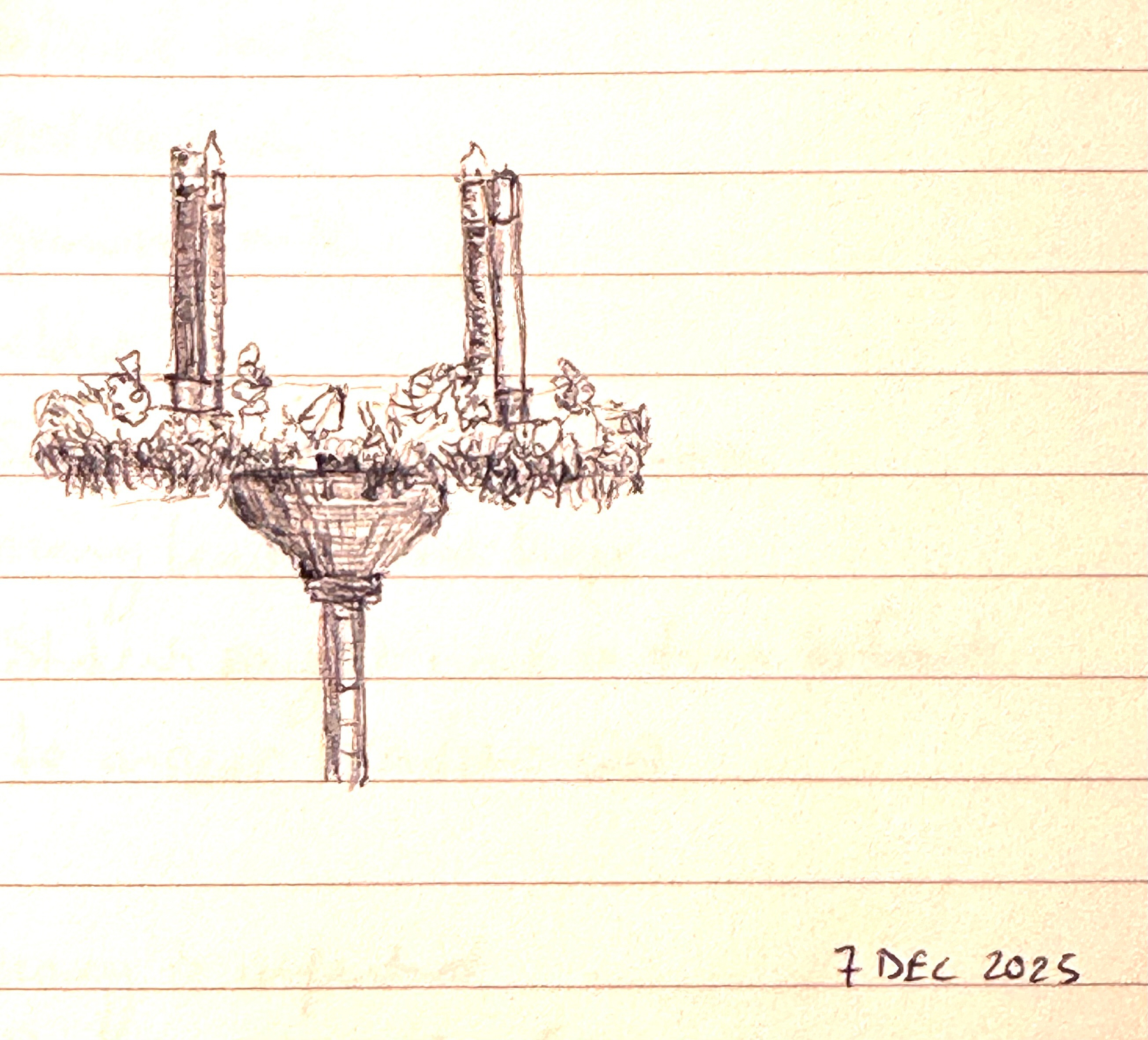Another nuthatch
This one is a white-breasted nuthatch I photographed in the Good Earth State Park near Sioux Falls two years ago. I figured it would be interesting to paint two species in the same day so I could see their similarities and differences. Sketching and painting helps me remember species, and it helps me teach them to my students as well.
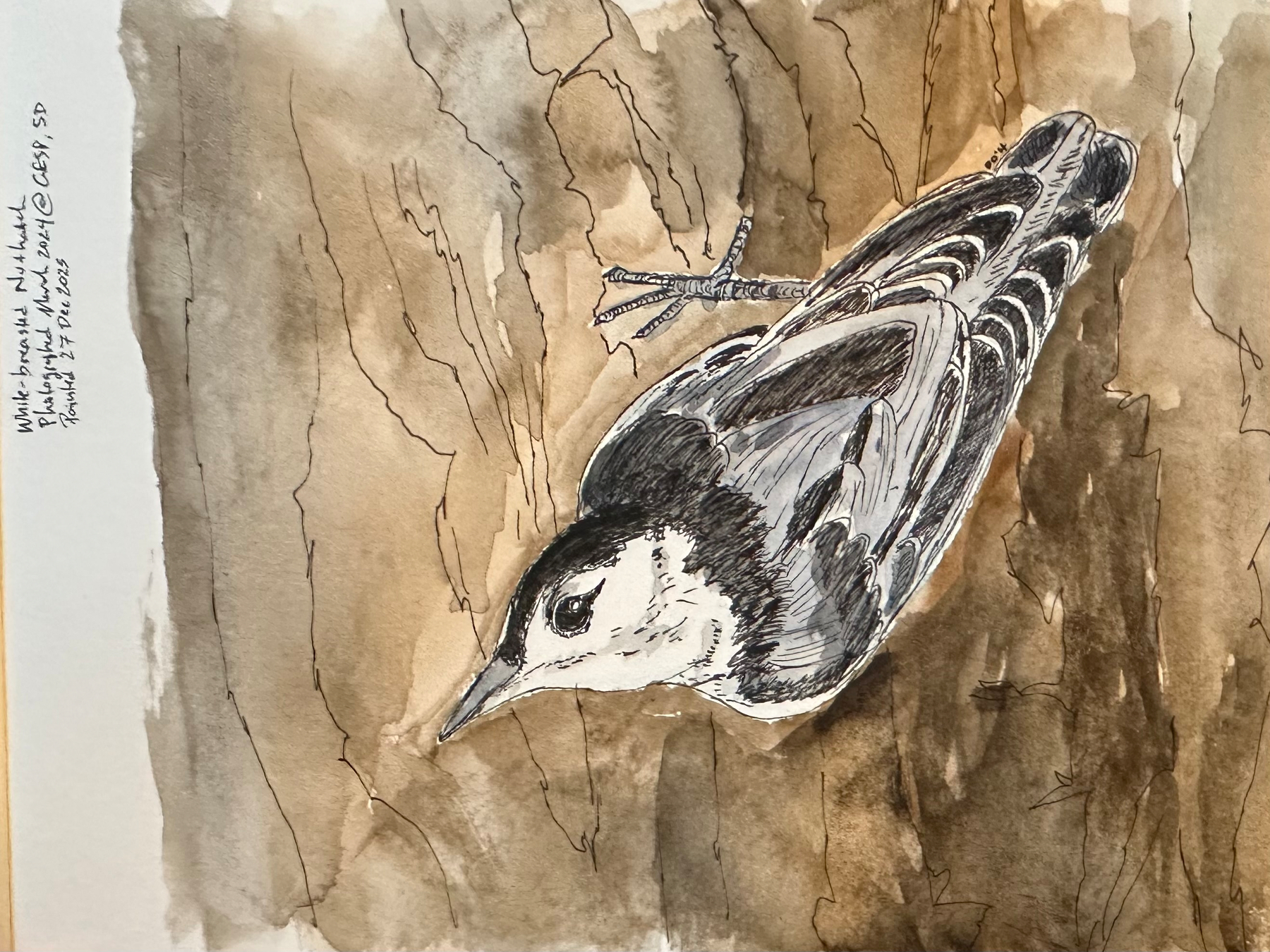
Sharing the Birds
The other day a visiting alum asked me about my nature journaling practice. I told him about the Wild Wonder Foundation workshop I participated in last summer.
John Muir Laws is an amazing teacher, and all semester I have been teaching my students what I learned from him, including quick ways of sketching birds.
So I asked my alum to show me a picture of any bird and told him I could teach him to sketch it in under a minute. Then I did so.
A little while ago one of the same species made a rare appearance at the feeder outside my kitchen window so I made a quick sketch next to the one I made for my alum.
And then I decided to paint it, which took more like half an hour.
I’m pretty pleased with the whole process, but especially with the teaching and the birding!
(Update: see my next post for more nuthatch art!)
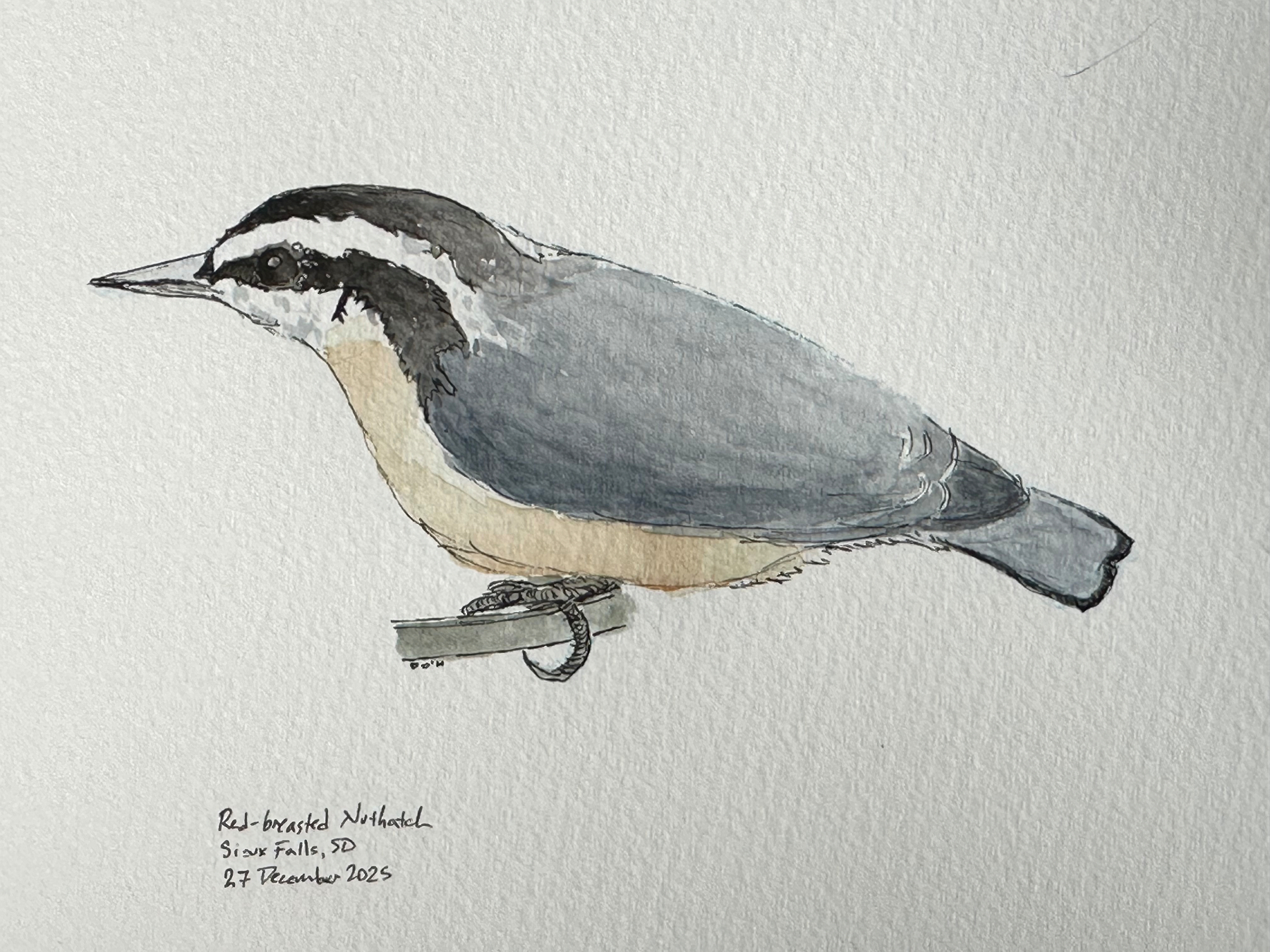
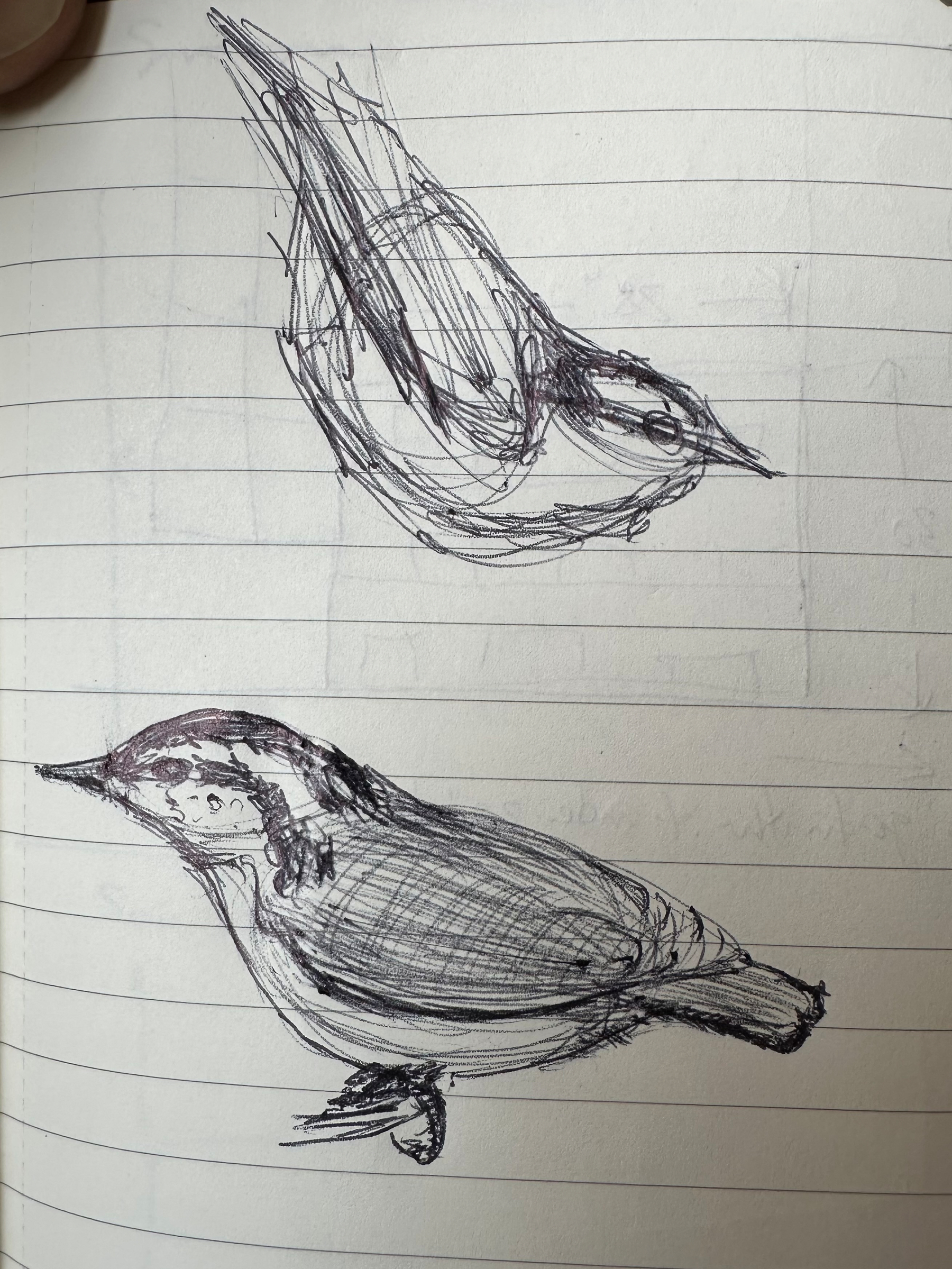
Even the furricane rests sometimes. He has had a busy morning being climbed on by my granddaughter. Both of them seemed happy with the play, and both are now sleeping.
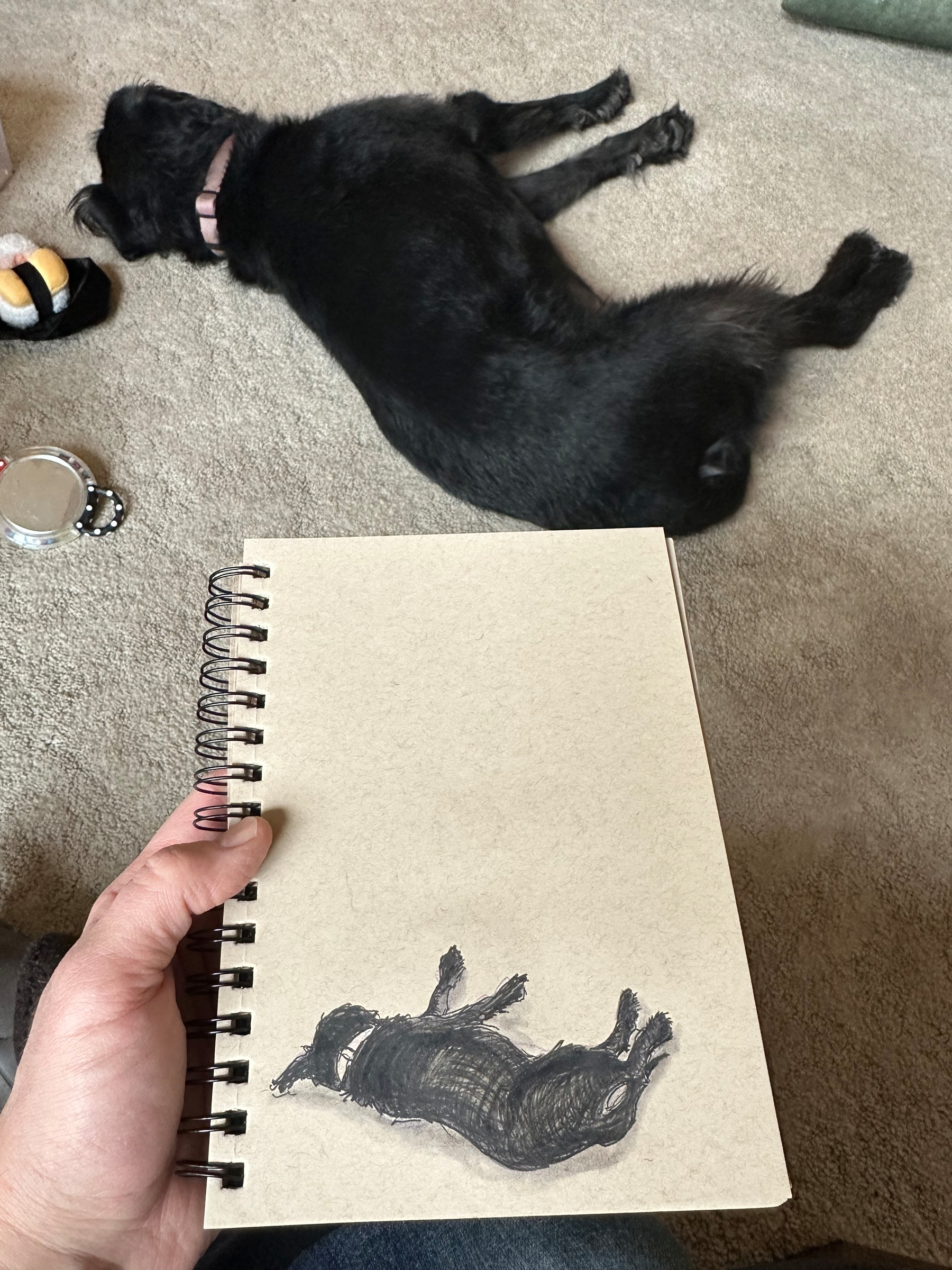
South Dakota
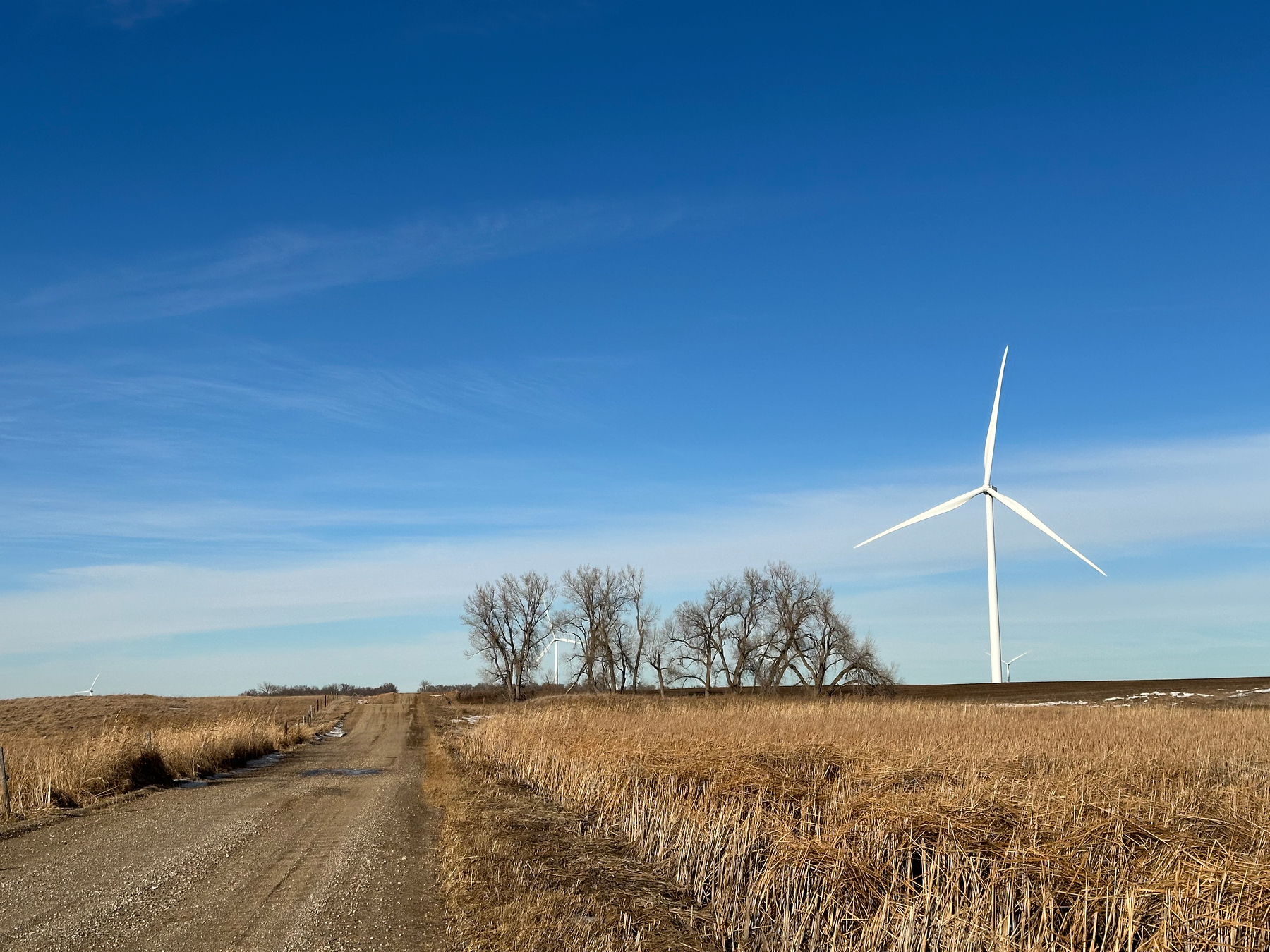
Seeing the world in my neighbor
This morning I had breakfast with an alum who is in grad school. He loves his studies but is also weary of political news. He is a gifted artist so I encouraged him to allow himself to see the local. Attend to the person in front of him, care for his neighbor, delight in what is nearby, and allow that delight to turn into gratitude and loving kindness. The small decisions can make a world of difference. In a way, the whole world is present in that one person, and love is not wasted on them, even if it might seem a squandering of effort to those who wish only to make big changes in the world. I came home and added a small scene to my sketchbook, choosing to attend to this small winter scene in my driveway. As I clear the snow from the sidewalk, I clear it for I know not who will walk there next. They are also worth loving.

Majoring in Business?
The most popular undergraduate major in the country is Business.
Which means that if you’re a business major, you’re likely to be a small fish in a big pond.
Here are some ways you can stand out as a bigger fish:
- Get at least one good internship. Ideally, get several, in different fields.
- Play a sport, at least recreationally.
Those first two are fairly self-explanatory. Here are some that are easier to overlook:
- Learn to play an instrument. You’ll become more disciplined, and you’ll think better. Best of all, you’ll bring music with you wherever you go.
- Study art history, and learn to draw or paint. It will help you see the world differently, and it will change the way you travel. It will also help you with design problems. And it will help you think better.
- Learn a language. I don’t mean “take two semesters of Spanish,” but I do mean learn well enough that you can have a thoughtful conversation in another language.
- Then learn another language, one which probably doesn’t seem important to you right now. Learn Latin or Greek or Classical Chinese. Learn a modern language you think you will never use.
- Study some other discipline throughout your college years. History, philosophy, religion, anthropology, literature. Something that seems pointless. These are things that simply make the world a more interesting place, and will continue to do so beyond your working years. Also, they’ll make you a better thinker, a better writer, etc.
- Take classes in math (ideally, at least through linear algebra) and science. This will help you to understand the world better.
- Study abroad. Note that I didn’t say “travel” or “become a tourist.” Actually study the places you go, and get to know people there.
There’s a lot more I could say, but I think if you do even some of this you’ll see how good it is.
Little Big Things
Today I took a little time to thank people for good work they’re doing. They were all doing “little big things” — things that probably seem little and ordinary to them, but that can add up to a big difference for others, like keeping things clean in their workplace. Each one was grateful that I had stopped to thank them. Most of them told me stories about how much they like the place they work and the people they work with.
The cost to me was a tiny bit of time and attention. The reward was hearing people talk gladly about their work and their colleagues.
Brothers better than gold
“How much better it is to have many brothers than it is to have a lot of money. For money stirs up plots among one’s neighbors, whereas brothers protect against the plotters.”
— Musonius Rufus, Fragment 15
(Cora Lutz, Musonius Rufus: “The Roman Socrates,” Yale Classical Studies 10 (New Haven, CT: Yale University Press, 1947), pp. 3-147.) Taken from The Stoics Reader, Hackett, 2008. Brad Inwood and Lloyd P. Gerson, trans. P. 184
Despite having just completed a sabbatical year, I find myself wishing I had more time to learn new things.
What is school for, anyway?
One of the peculiarities of our time is we don’t agree on the purpose of school.
So we often aim for something non-controversial, like job preparation.
Once we do that, we find it easy to stop talking about how schools can provide a place to learn the tools of reasoning, and to practice them.
We stop talking about schools as places of experimentation with ideas, in conversation with others, guided by guardrails of common care and mutual enrichment.
We forget about the delight of playing with tools of discovery like dictionaries and novels and guided time in laboratories.
We turn our attention away from the way writing and reading are like weightlifting for our inner lives.
We think of math and science as tools for professions and forget that they are about helping our minds and our communities reach out and get in touch with the way things are in the cosmos.
So many wonders of language and culture and math and thinking together become boxes to be ticked, grades to be tallied, rungs on a career ladder.
And then it surprises us when we one day find that the play is gone, the wonder and curiosity have been shoved aside as distractions from work, and learning has become a task rather than a privilege to pursue in joyful leisure.
(Our word “school” comes from the Ancient Greek word scholê which means leisure.)
So what is school for?
This is something we ought to spend more joyful leisure discussing in our communities, ideally while breaking bread together, with good music in the background, music and food that make us glad to be thinking together about the children we love, and what will become of their too-short, beautiful lives.
What do the mice know?
After a semester of teaching my environmental philosophy course outdoors and requiring my students to keep nature journals, I am continuing to practice what I teach. Here’s a wonder journal page I made this morning after this weekend’s bitter cold and snow, and after some encounters with mice on the bird feeder outside my kitchen window.
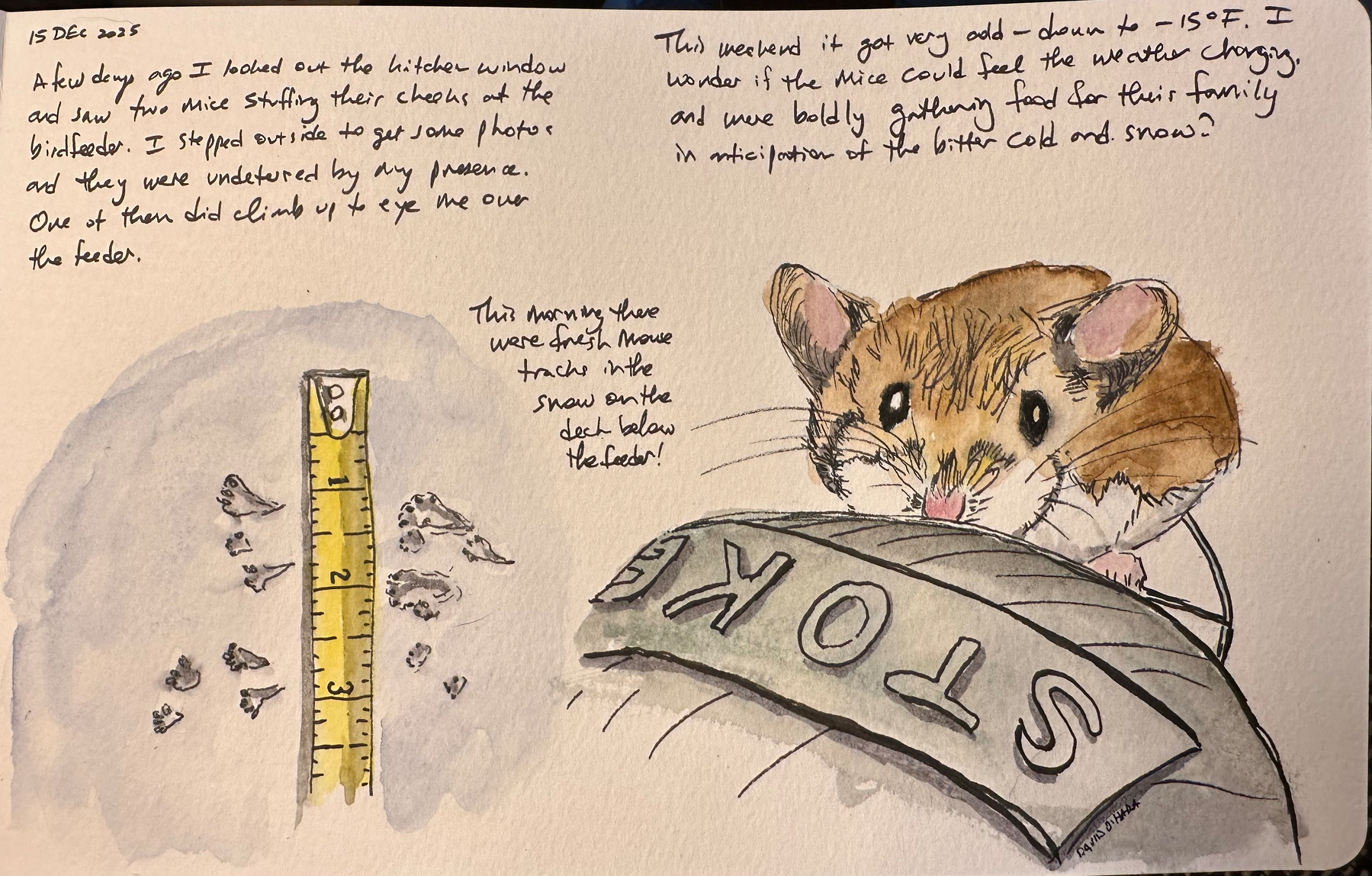
Whither College?
In a college religion class we studied the history of universities in the United States. Most of them had a similar trajectory: begin as small colleges to train pastors and teachers. Places to learn to reason together. Conversation, contemplation, commentary. Repeat.
The assumption was that professional training in most fields would happen as apprenticeships. Learn by doing.
Incremental changes added courses, faculty, programs.
These, in turn, require new buildings.
Which require funds.
Which opens the question: to whom should we appeal to fund all this expansion? And what are we willing to give up in that process?
What most schools gave up—again, incrementally—was whatever made them distinct in the first place.
All still speak of vision, aims, mission, values, timeless commitments.
Few still have anything like a unique value proposition, and if they do have one, even fewer of them have a unique value proposition related to the curriculum.
Fewer still seem to have a vision of something unique that they can offer that the world needs. Plenty will speak of what the individual will gain from their time at the school. Occasionally they will connect the prosperity of the individual with scientific research.
Very few speak of the importance of conversation, contemplation, and commentary. Few speak of the importance of learning human cultures so we can understand one another. Of studying languages so we can speak to one another. Of fostering civil conversation that leads to contemplation of the great stories we are all a part of, and from there to thoughtful commentary on how we can flourish mutually.
Obviously, studying those things doesn’t lead to a particular profession. My students who read great books with me and discuss them in Socratic seminars go on to all sorts of professions. Some become lawyers, some become research scientists, some are CEOs and legislators, some work in national security, and quite a few are teachers and pastors.
And loads of them return for homecoming or during holiday breaks and ask if we can get together for a meal, and for more conversation, more contemplation.
About fifteen years ago I saw a gap in our curriculum: we had no course on the great books of India and China (you know, a third of the world’s population) so I decided to develop one. It would be a seminar on classical texts. Students would read the great books with me, each one would learn some rudimentary Sanskrit and/or Classical Chinese (dipping their toes in the waters, so that they would develop research skills they could build on), and they’d discuss these books three times a week at a seminar table where no one sits in the back row. Face-to-face discussion with books open and with attention paid to the others at the table.
In order to prepare for this course, I decided I needed my own seminar group that would meet each week before I led the student seminars. I put out a call on social media: if you’re an alum of my college who is willing to meet with me each week to discuss these books over a beer, I’ll buy the books and the first round. I thought if I could get seven or eight people to meet with me that would help me to come to class as the best student in the room.
Within an hour I had forty-five people asking to join the group locally, and many more who live far away wanting to join remotely or wanting to start their own group.
Colleges that don’t notice this hunger among their alumni are paying attention to the wrong things.
We are all hungry for meaningful conversation.
We are all hungry for help thinking through the great questions (we call them “Great Books” because they raise the questions well and they show us others grappling with them.)
We are all hungry for a chance to step aside from the daily tasks that must be done, and to emerge from good conversations with a little more commentary forming in our hearts and minds, commentary that is slower and deeper than what social media and “breaking news” (such an apt name with an unintended double meaning) can ever offer.
I’m not opposed to teaching technical skills. In my career I have taught business courses, technology development, practical skills in building, landscape design, music, mathematics, biology and ecology, wilderness and backcountry skills, and languages. I’ve trekked forty miles with my students through dense rainforest, dived with them on coral reefs, hiked with them across remote tundra, brought them to a former Soviet bloc state to teach English and to do construction work.
And all of that has been great.
But very little can compare with the conversations we have when students open a classic text they thought was inaccessible and then, an hour later, discover that they found a story in that text that help them to understand themselves, their neighbors, and their world better.
Colleges should certainly pay attention to the data available as they try to chart the course ahead. It would be foolish not to prepare students for meaningful work. It would be also be foolish not to balance the budget.
But perhaps the greatest foolishness of all would be to fail to ask: why are we even trying to keep the doors open?
If it is valuable for our students to examine their own lives and their place in the world, then every college that claims to be able to help students to do that ought to practice what they preach.
And any college that does not help students examine their lives is not worthy to be called a college.
Today’s entry in the book I am writing for my granddaughter includes a sketch of one of the mice I saw at the birdfeeder. It’s cold out there! I hope the mice tucked away a good meal.
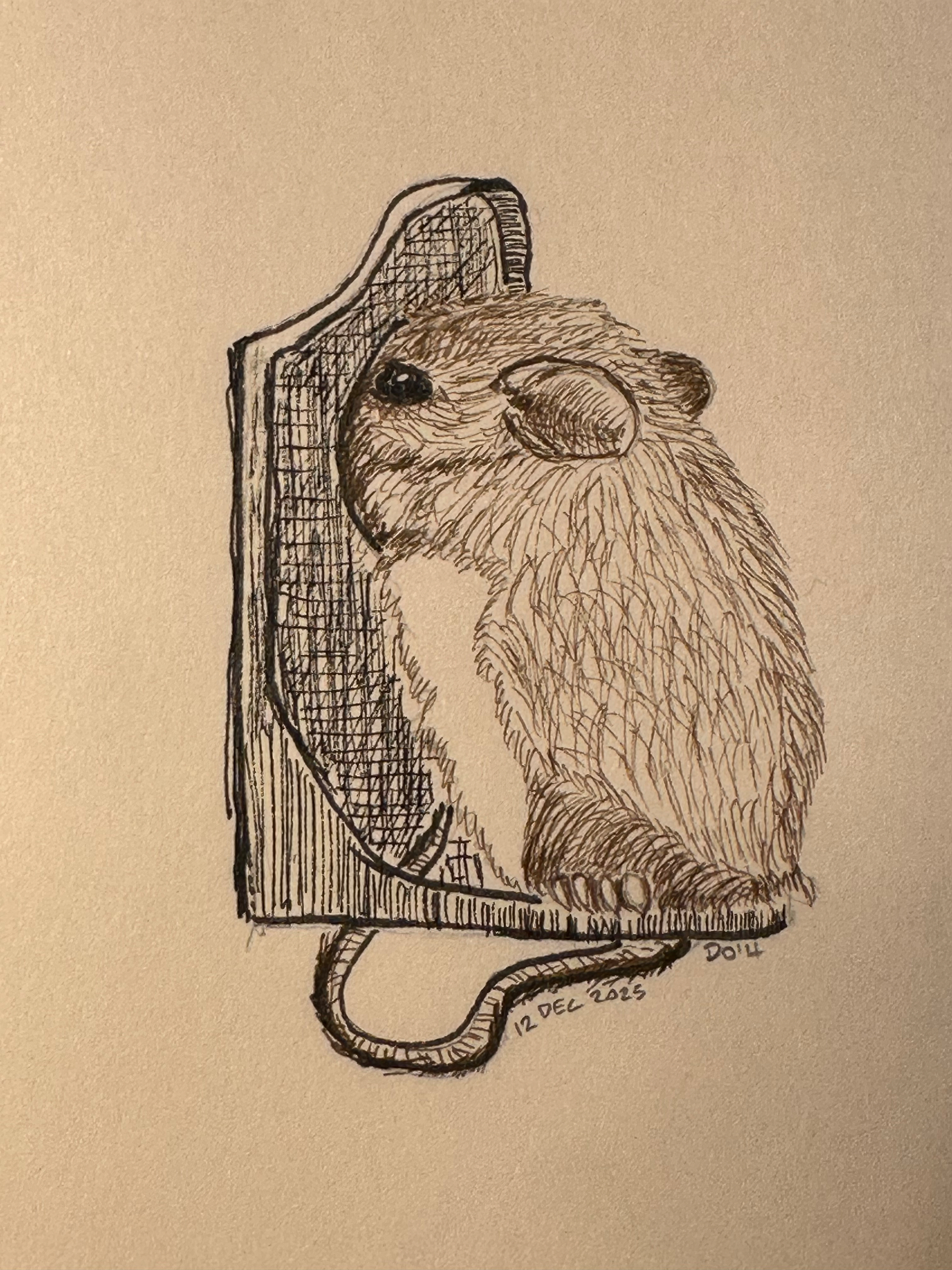
Celestial Observations
From a student report, in a class where I require them to do astronomical observations:
“I used to hate god, but looking at the stars has changed how I view ‘god.’ I looked up and saw something new. God is love.”
This is unprompted. The assignment was not about religion.
But I love seeing what they learn.
Another wrote:
“I learned so much more than I expected to learn. I learned about the motion of the sun, but I also learned about the spirit of the readings in the class.”
The class, by the way, is ancient and medieval philosophy. I want them to consider the skies as the ancients like Thales once did, without telescopes, but maybe with a mug of hot cocoa and a friend to chat with.
We often drive together to the Badlands National Park and watch the Orionid meteor shower, and a handful of us did that this October.
But no matter where they are, when the look up, they often see more than the stars.
I regret updating to IOS 26.1. I think Apple meant well but my screen is so much busier now, and the buttons that were familiar and helpful are now just a little harder to find.
Someone please tell me how cool the new IOS is. I must be missing something.
Socrates annoys even modern students, by refusing to tell us what justice is.
Instead, he asks questions to help us examine justice and the good life.
And so often we miss the point that justice is not a fact to be defined for a quiz, but an excellence to be pursued throughout our life together.
At the end of our exam yesterday my students applauded my course in ancient and medieval philosophy. I don’t recall that ever happening before.
Unvisited Tombs
In my last year of college I signed up for a course on the early English novel. In the first week the professor assigned George Eliot’s Middlemarch.
I had enjoyed reading long novels on my own, but when assigned an eight hundred page novel and given three days to read it, I quickly decided I had better things to do with my life.
I was already in a class on Cervantes (reading his original Spanish) and another class on medieval Spanish literature (often hundreds of pages of reading a day in that one) so I backed out and contented myself with a history class instead.
Some books are made for fast reading. Texts on biology and ecology I breeze through with exhilaration. When I read new research on malacology, I want to absorb it all quickly and then get out into the field as soon as possible.
Others are books I like to work through, like texts on mathematics. Some proofs are delights that need to be savored. Problem sets are, generally speaking, a gift, and a way of learning by playing.
Poems (especially short ones) and good novels are like landscapes. I don’t want to snap a quick photo and move on; I’d rather spend time wandering, seeing what grows there, feeling the ground under my feet.
So this year, a few (!) years after my senior year of college, I have returned to Middlemarch. And I’m so glad I am doing so when I have time to read it slowly. One chapter on Dr. Lydgate is full of criticism of higher education and of the pharmaceutical industry that still feels relevant today. Throughout, reflections on sainthood and on the individual lives of insignificant people in a small town (who’s to say these are not the same thing in any particular case?) are constant reminders of the hidden inner lives of the people next door.
And of course there is that passage I have often returned to, the reminder that the goodness of my life and of yours are both dependent on the many people who made small decisions that now affect us.
Some of them “lived faithfully a hidden life,” and we will never know their names, but our lives are now better because of them.
It’s tempting to play the lottery, to start the Next Big Thing, to earn a Name for oneself, to make a splash and be remembered for it.
Most of us, however, won’t have our names on great buildings. Most of us won’t make the history books. Most of us won’t win medals of honor, or have our deeds engraved on great stones for all the ages to see.
But that should not prevent us from living faithfully, even if our lives are hidden. Even if (perhaps especially if) we never become known as “influencers” or bestselling authors.
Our only reward might be long rest in a tomb that is untroubled by visitors.
When I am dead, I might not care. But the thought of living now in such a way that others might someday benefit from it makes the small things feel like acts of love, like planting the seeds of trees that will outlast me, and give fruit and shade to others who need them someday.
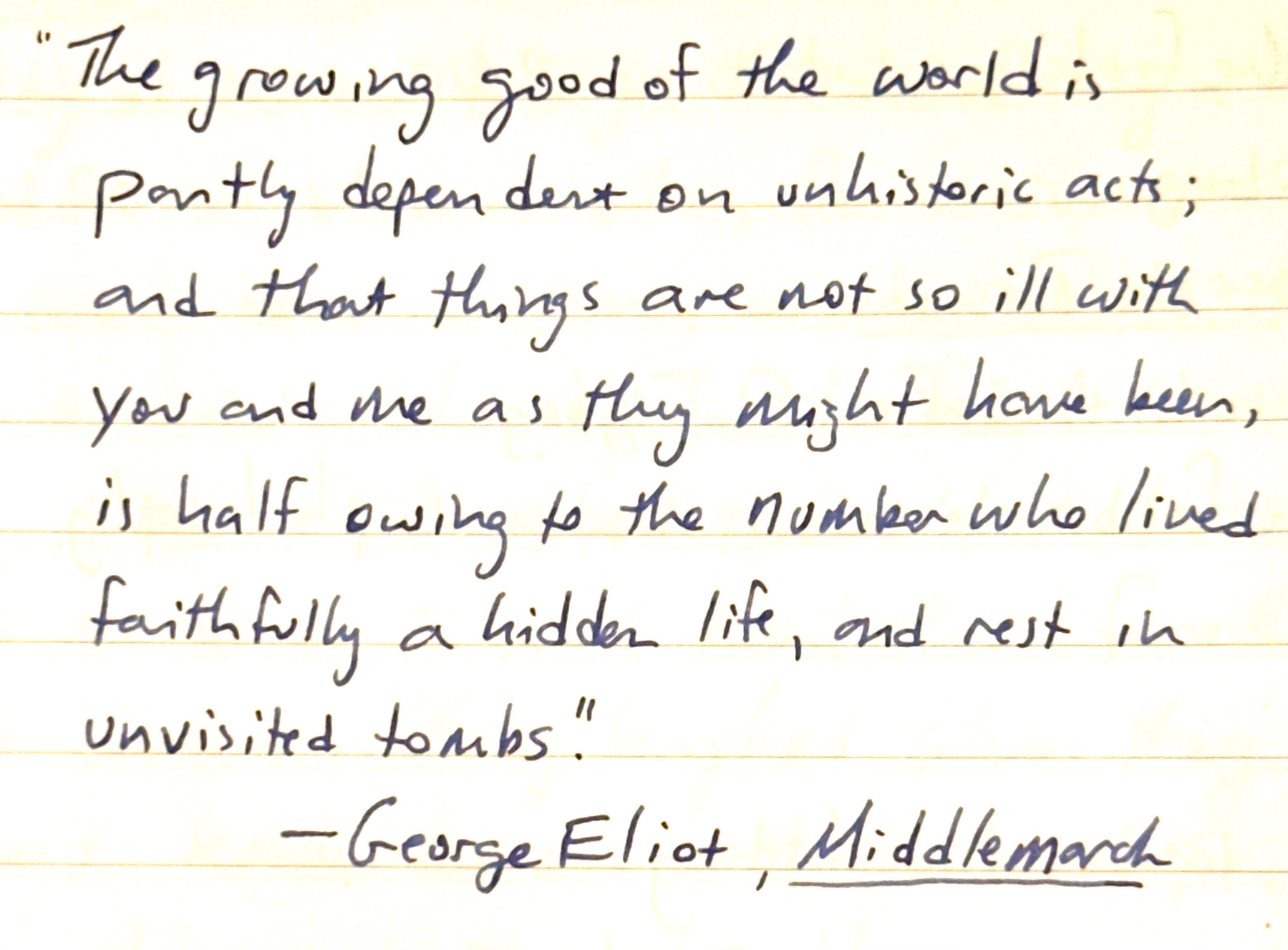
Peace Candle.
A meditation with ballpoint pen and pocket notebook before church began on Sunday, the second Sunday in Advent.
